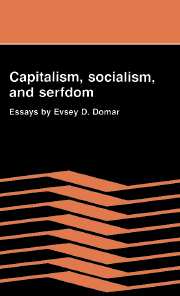Book contents
- Frontmatter
- Contents
- List of tables and figures
- Foreword
- Acknowledgments
- Part I Economic systems
- Part II Economic growth and productivity
- 4 On the measurement of technological change
- 5 On total productivity and all that: a review article
- 6 Economic growth and productivity in the United States, Canada, United Kingdom, Germany, and Japan in the post-war period
- 7 An index-number tournament
- 8 On the measurement of comparative efficiency
- Part III Soviet economics
- Part IV Slavery and serfdom
- Index
8 - On the measurement of comparative efficiency
Published online by Cambridge University Press: 05 March 2012
- Frontmatter
- Contents
- List of tables and figures
- Foreword
- Acknowledgments
- Part I Economic systems
- Part II Economic growth and productivity
- 4 On the measurement of technological change
- 5 On total productivity and all that: a review article
- 6 Economic growth and productivity in the United States, Canada, United Kingdom, Germany, and Japan in the post-war period
- 7 An index-number tournament
- 8 On the measurement of comparative efficiency
- Part III Soviet economics
- Part IV Slavery and serfdom
- Index
Summary
This essay began as an ordinary comment on Professor Bergson's paper. If by now it has become rather long and involved and has strayed into other, let us hope not unrelated, subjects, the fault is his and not mine: his paper was simply too interesting and too stimulating to be left in peace. On my first reading of Bergson's paper I jotted down even more comments than are reported here, only to find that Bergson, with his usual conscientiousness, had disposed of most of them in the next paragraph or on the next page. Obviously, it is impossible to comment on every aspect of his paper; utilizing my comparative advantage, I shall say very little about his statistical data (except at the very end) and shall concentrate instead on his general methods and on the meaning and significance of his results.
The theory
The theoretical part of the paper continues the discussion of intertemporal and interspatial comparisons of index numbers of inputs and of outputs began by Bergson and Moorsteen some years past. There is no doubt that everyone who constructs index numbers transgresses against honesty, and that every user thereof is an accomplice in the act: it is impossible to reduce a vector of quantities or of prices to a single number in an honest way. But what Bergson and Moorsteen have done is to make clear and explicit the assumptions on which the construction of these index numbers rests, and the rationale involved in preferring one set of weights to another, even if no true set of weights exists.
- Type
- Chapter
- Information
- Capitalism, Socialism, and SerfdomEssays by Evsey D. Domar, pp. 126 - 140Publisher: Cambridge University PressPrint publication year: 1989



